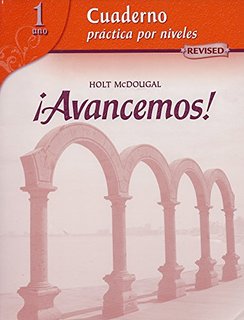
All Solutions
Page 303: Gramatica C
Each sentence has an affirmative or an indefinite word, so you should know their negative counterparts.
Example 1: **No** quiero comer **nada**. *(I **do not** want to eat **anything**.)*
Example 2: **Quiero** comer **algo**. *(I **want** to eat **something**.)*
*I want to know **something** about Miriam today.*
So, the negative sentence would read:
*I **do not** want to know **anything** about Miriam today.*
(**No** quiero saber **nada** de Miriam hoy.)
We negated the verb and used the negative counterpart of *”something” (**algo**),* which is *”nothing/anything” (**nada**).*
**algo ≠ nada**
*There is **a person** as angry as I am now.*
So, the negative sentence would read:
*There is **no person/not a single person** as angry as I am now.*
(**No** hay **ninguna persona** tan enojada como yo ahora.)
We negated the verb. We changed *”a person” (**alguna persona**)* to its negative counterpart *”no person/not a single person” (**ninguna persona**)*. Since *”alguna persona”* comes from a feminine noun *la persona*, we added an *-a* to *ningun*.
**alguna persona ≠ ninguna persona**
*She **always** shared her books and compact discs.*
So, the negative sentence would read:
*She **never** shared her books and compact discs.*
(Ella **nunca** compartió sus libros y discos compactos.)
Here, we only used the negative word of *”always” (**siempre**),* which is *”never” (**nunca**).*
**siempre ≠ nunca**
*She goes out with **someone**.*
So, the negative sentence would read:
*She **does not** go out with **anyone**.*
(Ella **no** sale con **nadie**.)
We negated the verb. We changed *”someone” (**alguien**)* to its negative counterpart *”no one/anyone” (**nadie**)*.
**alguien ≠ nadie**
*She wants to have **many friends**.*
So, the negative sentence would read:
*She **does not** want to have **any friends**.*
(Ella **no** quiere tener **ningunos amigos**.)
We negated the verb. We changed *”many friends” (**muchos amigos**)* to its negative counterpart *”no friends/any friends” (**ningunos amigos**)*. Since *”muchos amigos”* comes from a masculine plural noun *los amigos*, we added an *-os* to *ningun*.
**muchos amigos ≠ ningunos amigos**
**N.B.** Remember that double negation is allowed in Spanish.
*(Miriam does not want to play **any** video game.)*
In this sentence, both the verb (no quiere) and the word (ningún videojuego) are negated.
algún ≠ ningún
(some / a / any ≠ no / any / not a single one)
*(Miriam **never** refuses video games.)*
siempre ≠ nunca
(always ≠ never)
*(Miriam does not want to talk to **anyone**.)*
In this sentence, both the verb (no quiere) and the word (nadie) are negated.
alguien ≠ nadie
(someone / anyone ≠ no one / anyone)
*(**Neither** does Miriam want to leave her house.)*
también ≠ tampoco
(also ≠ neither / also no)
*(Miriam does not have to do **anything**.)*
In this sentence, both the verb (no tiene) and the word (nada) are negated.
algo ≠ nada
(something ≠ nothing / anything)
You should write two opposite sentences for three examples, so six in total. In the parenthesis are the adverbs you should include in your sentences.
Remember that double negation is allowed in Spanish.
– Yo **siempre** lavo mis dientes antes del desayno.
*(I always wash my teeth before breakfast.)*
– Yo **nunca** lavo mis dientes antes del desayno.
*(I never wash my teeth before breakfast.)*
siempre ≠ nunca
(always ≠ never)
– Yo salgo con **algunos** amigos los domingos.
*(I go out with some friends on Sundays.)*
– Yo **no** salgo con **ningunos** amigos lod domingos.
*(I do not go out with any friends on Sundays.)*
algunos ≠ ningunos
(some ≠ no / any)
In the negative sentence, we negated both the verb *(no salgo)* and the noun *(amigos)*. Since *”ningunos amigos” (some friends)* comes from the masculine plural noun *los amigos*, we added *-os* to *ningun*.
– Yo tengo **algo** que hacer después de las clases.
*(I have something to do after classes.)*
– Yo **no** tengo **nada** que hacer after clases.
*(I do not have anything to do after classes.)*
algo ≠ nada
(something ≠ nothing / anything)
In the negative sentence, we negated the verb *(no tengo)* and used the negative word *(nada)*.

